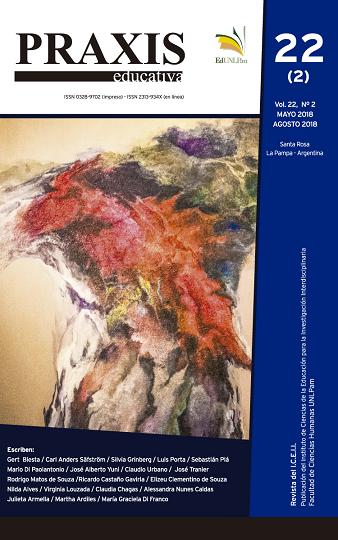Resonances and paradoxes of education. notes to speak on its behalf
DOI:
https://doi.org/10.19137/praxiseducativa-2018-220208Keywords:
education- episteme-ontology-paradoxical thinking-semiosisAbstract
In this work a set of notes that aim to dialogue with some of the questions left by the authors of the Manifesto are presented. Our reflective journey starts from considering that the demand formulated by Biesta and Säfström implies returning to a questioning mode that addresses the ontology of education as a nodal issue for educational theory and research. Our proposal focuses on investigating the tensions produced by addressing the signifiers of education from another epistemic record. Based on the episteme of the Human Sciences, topics that support the idea that education has its place in the cultural field are developed and that it acquires meaning as it generates and produces the process of humanization. Speaking in the name of education in an educational way requires overcoming binarism to enable thinking in paradoxical and complex terms.
Downloads
References
Arfuch, L. (2002) “Problemáticas de la Identidad” en Leonor Arfuch (Comp.) Identidades, sujetos y subjetividades.Buenos Aires: Prometeo.
Biesta, G.(2014a). “¿Medir lo que valoramos o valorar lo que medimos? Globalización, responsabilidad y la noción de propósito de la educación”. Pensamiento Educativo. Revista de Investigación Educacional Latinoamericana, 51(1), 46-57.
Biesta, G. (2014b). The beautiful risk of education. Boulder, CO: Paradigm Publishers.
Charaudeau, P. (1995) Une analyse sémiolinguistique du discours, revue Langages n° 117, Larousse, Paris, mars.
Charaudeau P. (2009) (dir.) Identités sociales et discursives du sujet parlant. L’Harmattan, Paris.
Colom Cañellas, A. y Nuñez Cubero, L. (2001) Teoría de la Educación. Madrid, Síntesis.
Filloux, J. C. (2009) Epistemología, Etica y Ciencias de la Educación. Córdoba: Grupo Editorial Encuentro.
Hassoun, J. (1996) Los contrabandistas de la memoria. Buenos Aires: Ediciones La Flor.
Jackson. P. (2015) ¿Qué es la educación? Buenos Aires: Ed. Paidós.
Maturana, H. (2014) El sentido de lo humano. Buenos Aires: Gránica.
Urbano, C. y Yuni, J. (2016) Psicología del Desarrollo. Córdoba, Grupo Editorial Encuentro.
Yuni, J. y Urbano, C. (2014) Mapas y herramientas para conocer la escuela. 4ta. Edición. Córdoba: Ed. Brujas.
Downloads
Published
Issue
Section
License
Copyright Notice
Editorial Committee Educational Praxis Magazine:
I hereby declare that I am the author of the article titled (article name), that it is original and my own and that it was not previously published in any other format or medium. I declare to know that the magazine will not charge me any type of fee under any circumstances, nor will I receive any type of monetary compensation If it were accepted for publication in Educational Praxis, I authorize the aforementioned magazine to publish it digitally and to advertise it on its social networks.
If the work is published, I adhere to the Creative Commons license called "Attribution - Non-Commercial Share Alike CC BY-NC-SA", through which it is allowed to copy, reproduce, distribute, publicly communicate the work and generate derivative works, as long as when the original author is cited and acknowledged. This license has been used since September 2018. In 2016 CC BY NC ND 4.0 was adhered to; and in the years 2017 and 2018 (January-August) CC BY NC 4.0.
This CC BY-NC-SA Share Alike license does not, however, permit commercial use of the work. As an author, the journal may establish additional agreements for the non-exclusive distribution of the version of the work published in the journal, it allows me to self-archive the published articles, in their post-print version, in institutional, thematic repositories, personal web pages or any other relevant use. with the recognition of having been first published in this journal.
Educational Praxis adheres to DORA (Declaration on Research Assessment) signed in San Francisco, California, on December 16, 2012, and to the Declaration of Mexico (Joint Declaration LATINDEX - REDALYC - CLACSO - IBICT).















_(1)2.png)


3.png)











_(2).png)






2.jpg)









